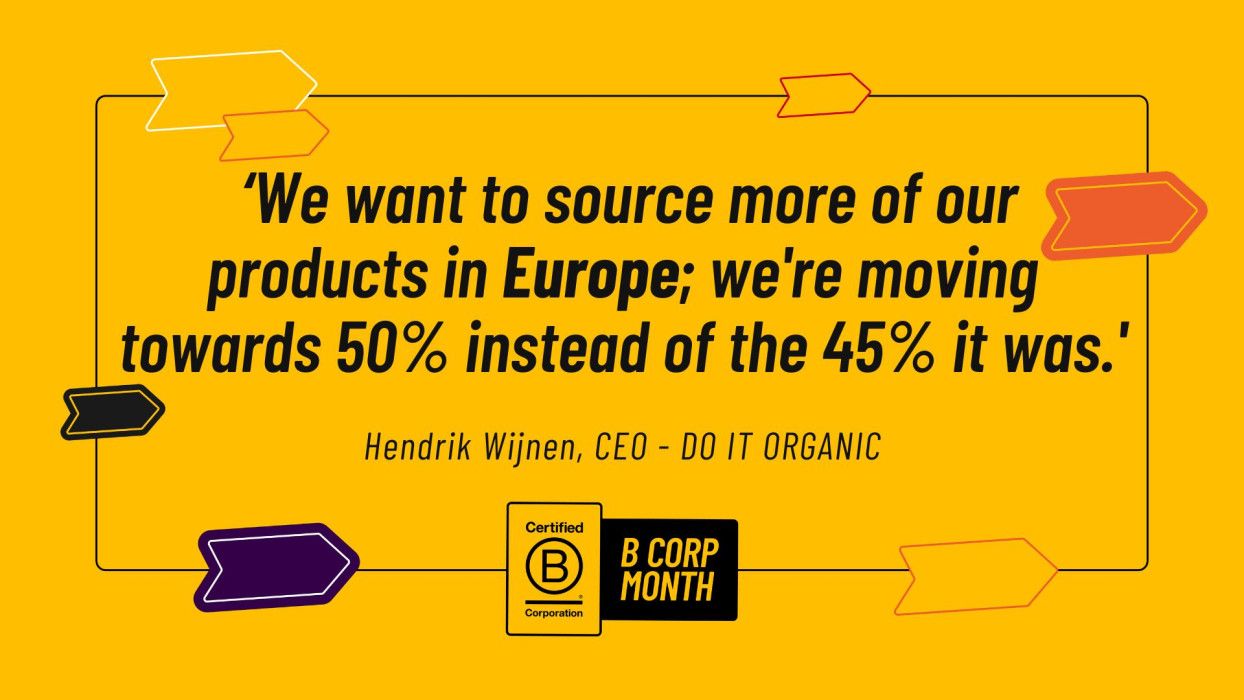
This way forward
This year, #BCorpMonth focuses on the future: 'This Way Forward' is the theme. Getting B Corp certified isn't just a pat on the back; it's more of a nudge to keep on pushing ourselves to do better. How does DO IT Organic accomplish this? We asked CEO Hendrik Wijnen.
B Corp evaluates businesses in five crucial areas: governance, workers, community, environment, and customers. Which areas is DO IT Organic focusing on, and why?
'We're really putting our efforts into community, environment, and customers. The community is key because we're helping farmers move from traditional to organic farming, ensuring they get fair prices and access to markets that want their produce.
The environment is crucial as well; organic farming benefits not just the planet but also the health of people, animals, and biodiversity.
Our customers are incredibly important too, as we strive to provide them with dependable supply chains.
While we absolutely value our workforce, treating them well is standard practice for us. Governance receives less attention, not because it's unimportant, but because conducting our business ethically and transparently is just part of our ethos. Our end goal is to make organic farming the standard.’
Where could DO IT Organic improve, and what's the plan?
'It's somewhat amusing, actually. We thought we were doing quite well on the eco-front, but the B Corp assessment revealed we had overlooked sustainable practices within our operations. We hadn't set any goals for reducing energy usage. Now, we're aiming to cut our gas and electricity consumption by 5% in the next year.’
How are you doing that?
'We are investing heavily. Some of our products come from the tropics, occasionally they contain live insects or their eggs. To combat this, we've recently built our own EcO2 chambers, to naturally eliminate these pests. Previously, we outsourced this process, but now having it in-house reduces transport needs and CO2 emissions.
Additionally, we are examining our transport methods. For instance, we're researching train logistics. Can you imagine? A trailer of chickpeas on a train from Sicily?
What about the plastic situation?
'Plastic was a major headache! But sometimes it's unavoidable. We use wrap film to secure pallets, but now we're opting for film with holes, which uses less plastic. We've also purchased a plastic press, making the plastic much more compact and thus reducing the number of trucks needed to collect the plastic.'
Are there any other areas which have room for improvement?
'Definitely! We've made considerable progress in terms of our team's health and safety, and now we're developing a culture handbook. This handbook will address inclusivity, things like: ensuring there are halal and kosher options at lunch, allowing Muslims to work on Ascension and Pentecost if they wish, and being off on Eid al-Fitr.
But also things like how quickly we respond to each other's emails and WhatsApp messages. It may seem minor, but clarity in these areas can significantly improve the working environment.
In addition, I think we can make a further impact for our customers in terms of availability, i.e., being out of stock less often. One of the ways to do this is by sourcing even more of our products in Europe; we're moving towards 50% instead of the 45% it was.'
What's the biggest goal for DO IT Organic looking ahead?
'Our main objective is to grow the business, expanding into new markets such as the US and introducing new product categories. Achieving this growth would enable us to launch more initiatives and accelerate the transition to organic.'
What is the biggest obstacle?
'Overall demand for organic products is increasing, but it's somewhat slow in certain countries, especially the Netherlands. The EU's Green Deal aims for 25% of agriculture to be organic by 2030, yet the Netherlands is currently at 4% and has reduced its target to 15%. We need to boost demand for organic products as an industry, and it's heartening to see big retailers moving towards organic. We're committed to making this happen.'